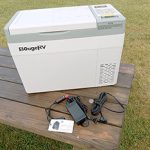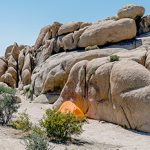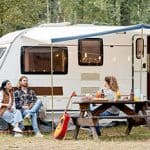
Boondocking is a perfect way to explore the great outdoors and escape the stress of everyday life. But one often-asked question needs to be answered: Do you need solar to boondock?
Solar power is not necessary when boondocking, but it can be beneficial. Solar panels provide a source of energy that can be used to run lights, appliances, and other electronics while staying off the grid. Also, having a reliable power source can help extend your length of stay.
Solar power provides a reliable source of energy that can help make your outdoor adventures more enjoyable. In this post, we’ll explore the benefits of solar power for boondocking and discuss whether or not it’s a necessity.
What Is Boondocking?
Boondocking is one of those unique experiences that dedicated camping enthusiasts can appreciate. For many, it’s a compelling concept!
Essentially, it’s a way to camp – but here’s the catch: you do so without access to any of the facilities you’d typically find at a traditional campground. Imagine driving off the beaten path, finding the perfect spot in the heart of nature, and spending your days without any connection to modern conveniences – no electricity, running water, sewage connections, or Wi-Fi.
Basically, it’s the art of self-contained, off-grid camping, usually in a recreational vehicle like a motorhome, camper, van, or even a tent, that challenges you to rely on your own resources and survival skills. But on the plus side, it allows you to explore and park in a wide variety of locations that might be untouched by, or at least less crowded with, fellow adventurers.

Boondocking (also known as “dry camping” or “dispersed camping”) is an excellent opportunity to embrace a self-sufficient and off-the-grid lifestyle while experiencing the beauty of nature in a completely unique way.
Just remember to plan ahead, conserve resources, follow local regulations, and always practice leave-no-trace principles – because the last thing we want to do is spoil these awesome spots for others. So, are you up for the challenge?
Is it Possible to Boondock Without Solar?
You might be wondering if solar power is a necessity for boondocking. Well, the truth is, while it’s not absolutely essential, having solar power can significantly enhance your off-grid experience. The truth is, it ultimately depends on your individual needs and preferences.
A solar power setup would benefit those who plan to rely heavily on electronic devices, such as charging phones and laptops, or running appliances, like a refrigerator or air conditioning. Not only does it provide a sustainable and eco-friendly way to generate power, but it also allows for more extended stays in off-the-grid locations.
On the other hand, if your boondocking trips are more focused on disconnecting and living simply, a solar system is likely, not essential.

The key here is to thoroughly assess your energy needs and preferences before embarking on your boondocking adventures, as this will guide your decision on whether or not solar power would enrich your experience.
So, while solar power might not be a strict requirement for boondocking, there are definitely perks to going solar that will make your experience more enjoyable and worry-free.
Van Camping Life Fun Fact: The Oregon Trail was a significant 19th-century route used by settlers to travel West in search of new opportunities and experiences. With over 2,100 miles, the journey was long and often challenging, but it offered a chance for many to start fresh in the ever-evolving American West.
Other Posts of Interest
- What Is The Difference Between A Camping Fridge And A Cooler?
- Are Camping Fridges Worth It? These Ones Are!
- What Vans Can You Stand Up In?
- How To Convert A Transit Van Into A Camper: The Ultimate Guide
Power Sources While Boondocking
Boondocking can be a great way to escape the pressure of everyday life, but it can be difficult if you don’t have access to reliable power sources. That’s why it’s essential to understand your options and find the best power source for your specific needs. Many choices are available, from traditional methods like generators to modern solutions like solar and wind.
1. Generators: Generators are a popular and reliable way of obtaining power while boondocking. They provide consistent electricity for your electronics and appliances with relatively low maintenance costs. However, they can be noisy and require regular refilling of fuel.
Note: Make sure your generator can run sensitive electronics like TVs, computers, or mobile devices that require clean, stable power, or you will end up ruining your electronic equipment.
2. Duel Fuel Generator: Dual fuel generators are becoming increasingly popular due to their versatility in providing clean energy while boondocking. These devices allow you to switch between gas and propane as fuel sources, so you can always have access to reliable power – even in remote locations where other power sources may not be available.
3. Solar Panels: Solar panels are an excellent option for those looking to achieve an off-grid lifestyle, as they provide a reliable source of energy that doesn’t depend on electricity from the grid. Investing in solar technology allows you to generate power and enjoy all the benefits of off-grid living.
Boondocking with solar power is a popular choice, and there are now a variety of solar panel options available, from lightweight foldable panels for those on the move to more powerful kits for larger setups.
4. Solar Generator: A solar generator is a device that uses solar energy to generate electricity. It typically consists of a solar panel, battery, and power inverter and can be used to power appliances, lights, and more. Solar generators are a good option because they provide reliable, clean energy even in remote locations.
One such example is the Safari ME™. A portable solar generator that provides 2,000W / 922Wh of power to almost any device you plug into a standard wall outlet (15A). It features multiple outputs, including AC, USB-A, USB-C, and 12V ports, making it perfect for powering appliances, communication devices, medical devices, and more.
In addition, recharging from the wall takes as little as 83 minutes, and from the sun, only 95 minutes. Best of all, the Safari ME is maintenance-free and can retain its charge for up to 1 year. Additionally, you can add an optional expansion battery pack called the Safari ME-XP for increased efficiency.
5. Wind Turbines: Wind turbines are gaining popularity among boondockers due to their renewable energy capabilities. These devices produce clean electricity with no noise or emissions, allowing you to stay off-grid without any negative environmental impact – something traditional methods like generators cannot offer. This one is adaptable and uses water, wind, or human power to generate electricity.
6. Propane: Propane is another option that many people rely on for meal preparation since it’s portable and provides clean burning energy without having any negative environmental impact.

7. Batteries/Power Banks: Batteries or power banks are a superb choice for those who want an easy-to-use yet reliable power source while boondocking. These devices store energy which can then be used to charge your electronics or run small appliances such as lights or fans. In addition, they require little maintenance and are relatively inexpensive compared to other options.
8. Inverters: An inverter is a device that converts direct current (DC) into alternating current (AC). This means that you can use your vehicle’s battery as a source of electricity by plugging an inverter into the lighter socket – making them a great option for those who don’t have access to other types of power sources while boondocking.
Note: You could run your vehicle battery down with this, so be careful.
Ultimately, the right power source will depend on your needs while boondocking – so make sure you weigh all your options before deciding!
Can I Have a Campfire While Boondocking?
Campfires over the years have become a vital part of camping. Even though they can’t power your electronic devices, they do offer campers a way to cook, stay warm, provide illumination, and a setting for spending quality time with family, but are you allowed to have a campfire while boondocking?

The answer to this question will vary depending precisely on where you plan to boondock. Many areas will probably have seasonal or temporary fire bans in place, especially during dry or high-risk times of the year.
However, even if there isn’t a ban, you should take into consideration any potential fire risks, such as dry weather, strong winds, dry grass, or nearby vegetation that could easily ignite from a stray spark from your fire. So using a little bit of common sense could prevent a situation that could get out of hand.
If campfires are permitted where you will be camping, your first option should be to use an existing fire ring or construct a fire pit at least 10 feet from any trees or brush. After you have the fire going, never leave your campfire unattended, and as a precaution, always keep a bucket of water or sand and a shovel nearby in case you need to put out the fire quickly.
Also, remember that many popular boondocking sites, such as those located in national forests or Bureau of Land Management (BLM) areas, have specific rules and regulations concerning starting fires. Therefore it’s always an excellent idea to check beforehand with the appropriate governing agency or the local ranger station to make sure you comply with all local laws.
We also have a post, “Do You Need A Permit To Camp On BLM Land?” if you would like to know more about camping there.
Exploring America’s Wild Spaces
Boondocking is a great way to experience the outdoors without staying in a crowded campground. However, you should be prepared with the appropriate gear and know local laws and regulations to help ensure a successful boondocking adventure. Solar technology can come in handy when boondocking, but it’s not essential for having a great time outdoors.






